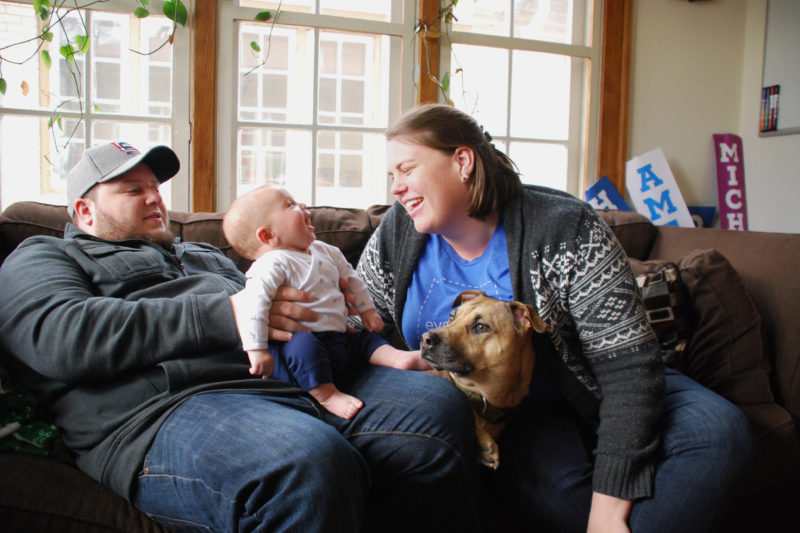‘I Felt Like I Was a Walking Attempted Murder’: Pregnant and Scared in Pence’s Indiana
Fueling fears in the wake of HB 1337 was the case of Purvi Patel, who had been sentenced to 20 years in prison the previous March after delivering what she said was a stillborn fetus and disposing of it in a dumpster.

Click here for more of our reporting on the implications of HB 1337 in Indiana.
Ali Brown’s pregnancy felt tenuous from the moment the test came up positive in her Indianapolis apartment last year. She was among a tiny minority of people who get pregnant while using an intrauterine contraceptive device (IUD). After her IUD was removed, Brown knew she was likely to miscarry. But weeks later she was still pregnant, and excited to finally tell her friends.
Then, she went to an appointment with her midwife on June 27, 2016, four days before one of the country’s most sweeping anti-choice laws was due to take effect. Signed by Vice President Mike Pence when he was Indiana governor, HB 1337 required burial or cremation of all fetal remains, whether from an abortion or a miscarriage. Brown’s midwife gave her a chilling warning.
“She’s like, if you miscarry, you need to keep all the clothes you’re wearing,” Brown, who runs a nonprofit, told Rewire in an interview. “Don’t wash them. You need to put on a pad and you need to keep that pad. You need to keep anything you bleed on. If you took any medicine that day, make sure you know what it is.”
Brown’s excitement about her pregnancy turned to fear.
“All of a sudden I felt like I was a walking attempted murder,” Brown said.
She began carrying gallon Ziploc bags in her purse, just in case.
Nothing in the law said people could go to jail for a miscarriage. It put the burden to ensure burial or cremation on health-care facilities, and did not impose criminal penalties. In fact, the American Civil Liberties Union of Indiana and the judge who ultimately blocked parts of the law argued it did not apply to patients who chose to take custody of fetal remains themselves. But critics said the law was vague enough that it could conceivably apply to all miscarriages, even those that happened at home.
Fueling fears in the wake of the law’s passage was the case of Purvi Patel, who had been sentenced to 20 years in prison the previous March after delivering what she said was a stillborn fetus and disposing of it in a dumpster. Prosecutors accused her of taking abortion-inducing medication, even though no such drugs were found in her system. Patel was released last year after an appeals court vacated her convictions for feticide and felony neglect of a minor. Combined with the earlier case of Bei Bei Shuai, jailed after attempting suicide while pregnant, the Patel case helped make Indiana a cautionary tale for what advocates see as an expanding criminalization of pregnancy, particularly for women of color.
Patel’s ordeal began with a call to the police from an anti-choice doctor at a Catholic hospital whose foundation has donated hundreds of thousands of dollars to a chain of anti-choice fake clinics in Indiana. (For more on Rewire’s companion investigation of St. Joseph Regional Medical Center and the implications of HB 1337, click here.)
Purvi Patel was prosecuted under Indiana’s existing laws, not the anti-choice law Pence signed last year. But her case, combined with the new law, sparked fears of a wider crackdown on pregnancy loss in Indiana.
“Nobody had any real trust in the system because Purvi Patel was sitting in jail at that time,” Zach Brown, Ali’s husband and a Democratic political strategist, told Rewire. “So could they just make up another law and all of a sudden one of my friends is in jail or my wife is in jail?”
Ali Brown never had to find out. She delivered her son, Dylan, one week before Trump and Pence took the oath of office.
